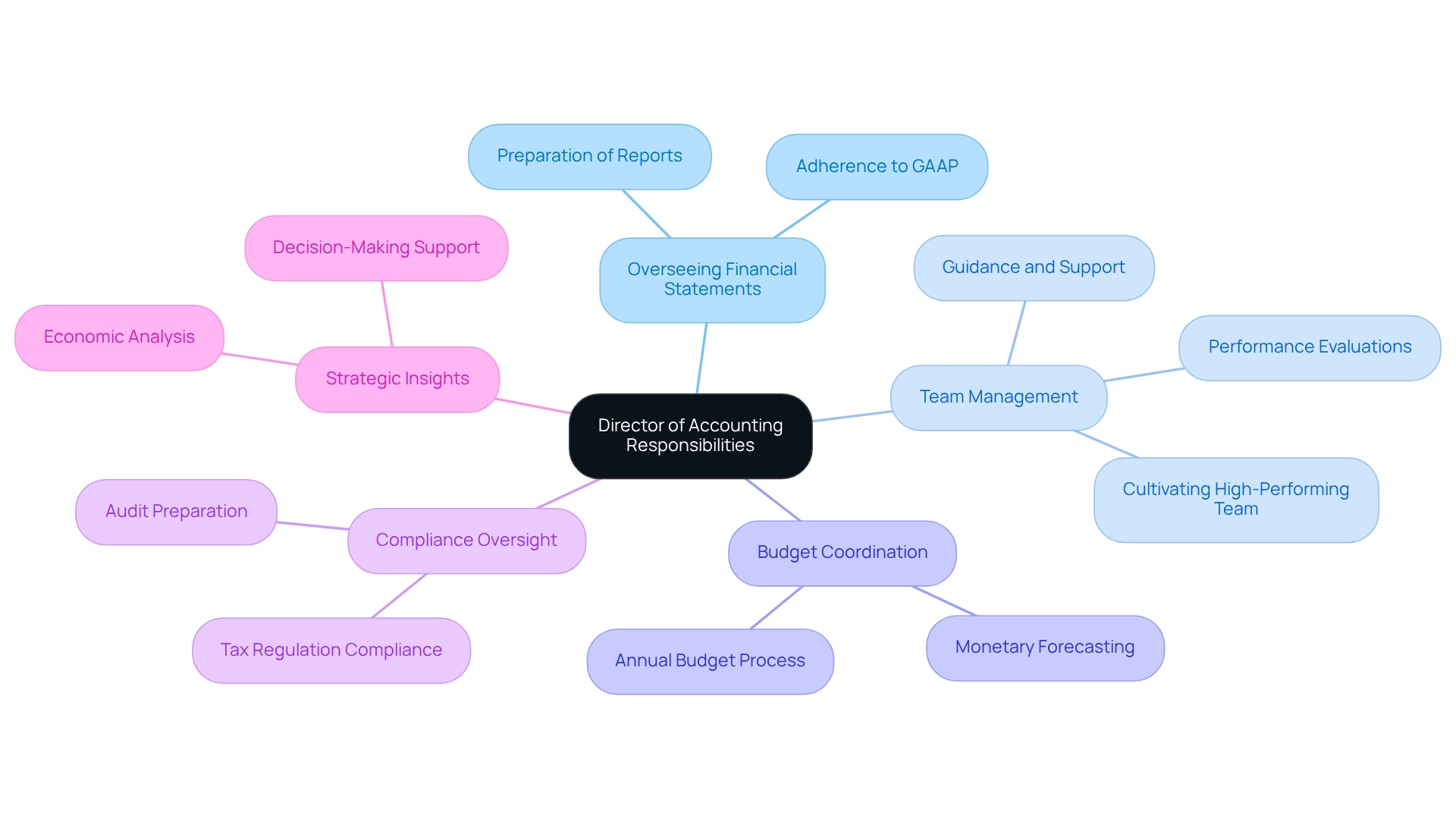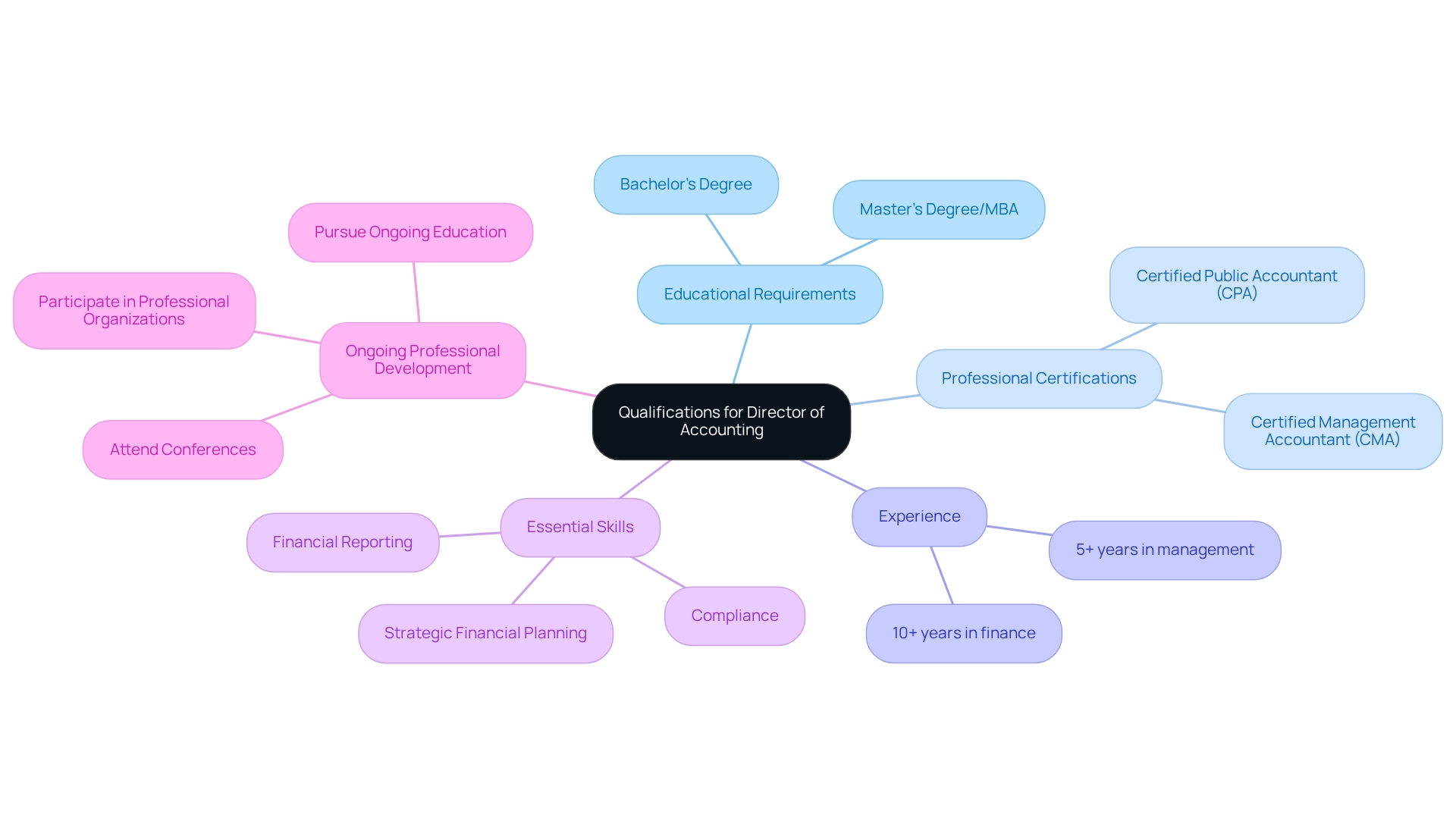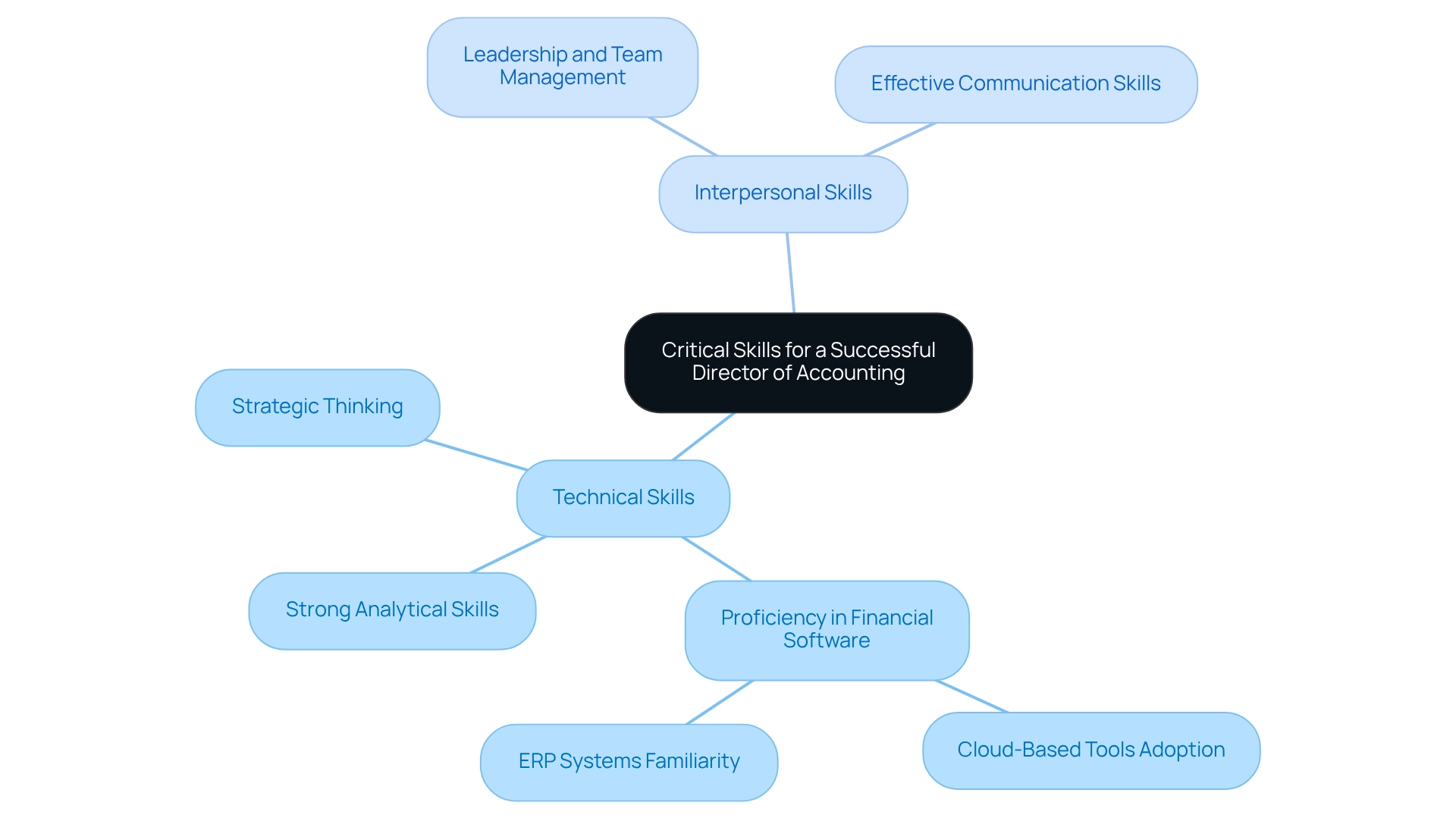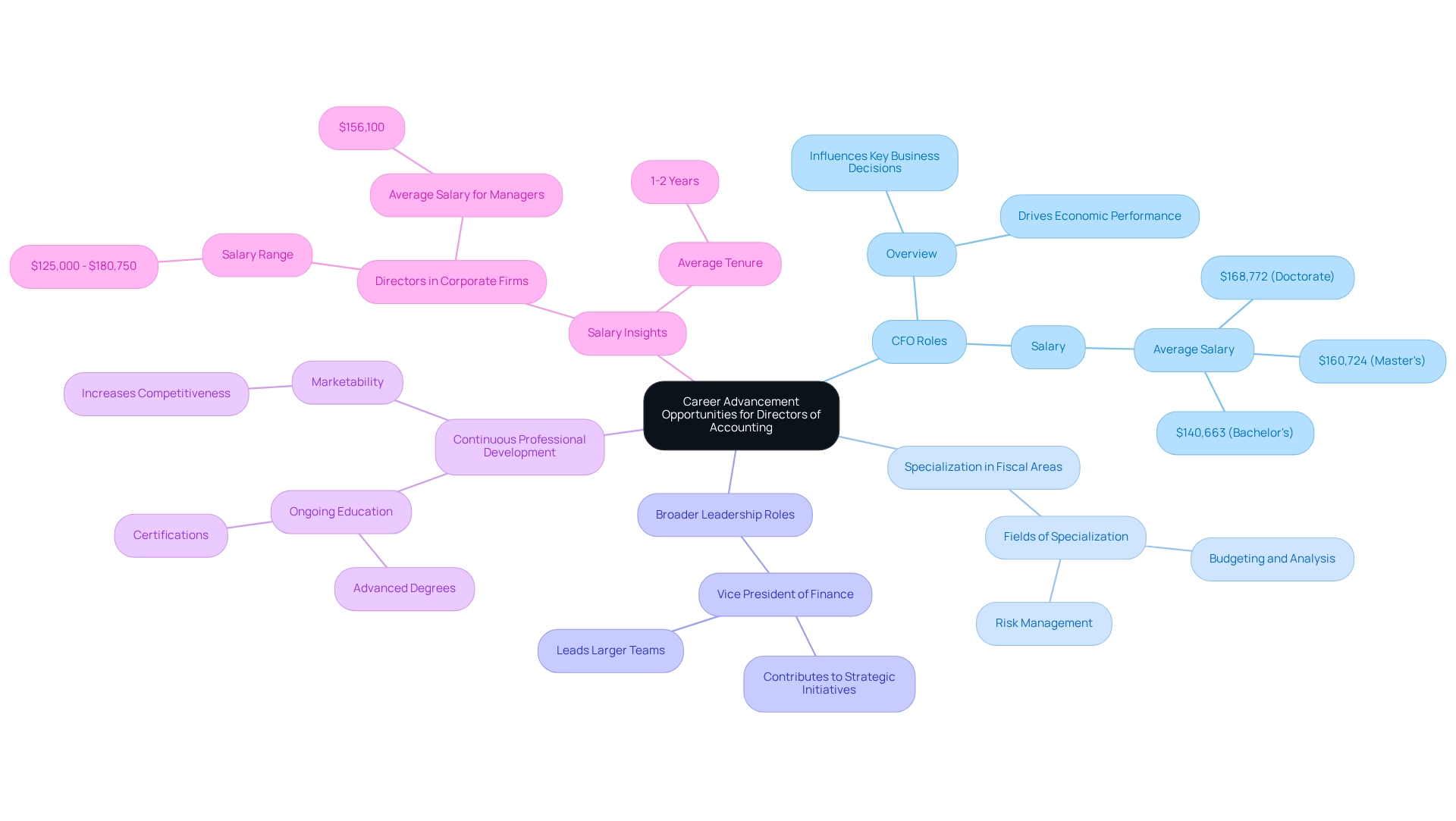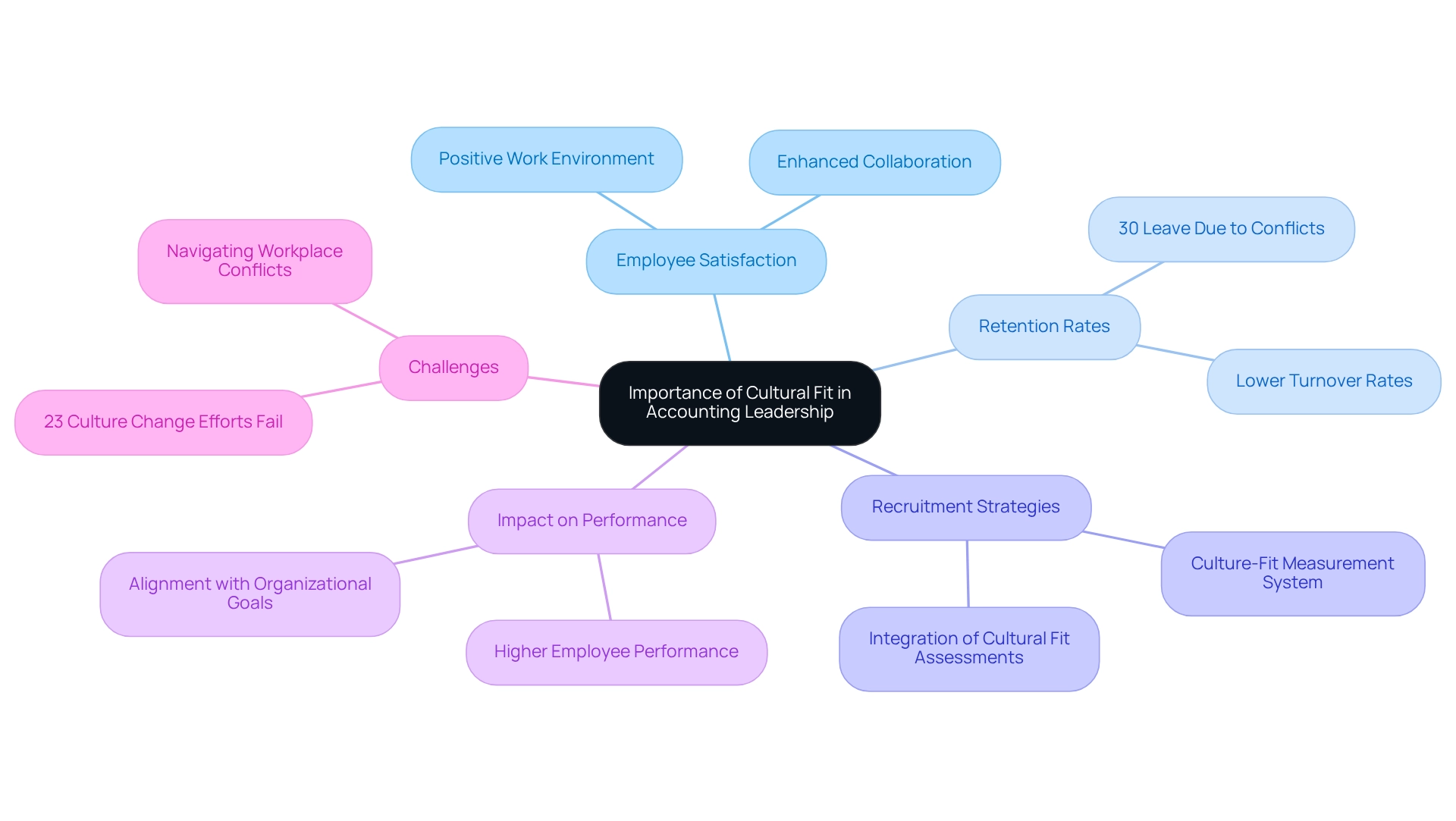Overview
The job description for a Director of Accounting is critical, encompassing the oversight of financial operations, ensuring compliance, and the development of accounting policies. This role demands not only strong technical skills but also exceptional interpersonal abilities. Key responsibilities include:
- Managing financial statements
- Coordinating budgets
- Overseeing compliance
All of these underscore the strategic importance of this position within organizations. Furthermore, the necessary qualifications and career advancement opportunities serve to highlight the value this role brings to the financial sector.
Key Highlights:
- The Director of Accounting oversees financial operations, ensuring compliance and developing accounting policies.
- This role is crucial for aligning financial practices with business strategies and regulatory requirements.
- 23% of firms are hiring retired finance professionals as consultants to address staffing challenges.
- The role requires strong technical expertise and interpersonal skills to attract younger talent.
- Key responsibilities include overseeing financial statements, team management, budget coordination, and compliance oversight.
- Successful Directors of Finance contribute to strategic monetary planning and provide insights for decision-making.
- Candidates typically need a bachelor’s degree, relevant certifications (CPA or CMA), and at least 10 years of experience.
- The average salary for Directors of Accounting ranges from $115,000 to $200,000, influenced by location and industry.
- Career advancement opportunities include roles like CFO, specialization in finance areas, and broader leadership positions.
- Cultural fit is essential for improving employee satisfaction and retention, impacting overall team performance.
Introduction
In the intricate landscape of finance, the position of Director of Accounting emerges as a fundamental pillar of organizational success. This senior-level executive is not merely responsible for managing financial operations; they also play a critical role in ensuring compliance with the ever-evolving regulatory environment and nurturing a culture of transparency and integrity.
As businesses navigate the complexities of financial management, the demand for adept Directors of Accounting has escalated, fueled by the necessity for strategic financial planning and effective team leadership. Given the continuously shifting landscape, grasping the essential qualifications, key responsibilities, and vital skills required for this pivotal role is crucial for organizations aspiring to excel in a competitive arena.
Moreover, as the workforce evolves, so too do the expectations of prospective candidates, rendering cultural fit and adaptability indispensable factors in the recruitment process.
Understanding the Role of a Director of Accounting
The Director of Finance is a senior-level executive tasked with overseeing an organization’s monetary operations. This pivotal role encompasses the management of the accounting department, ensuring compliance with economic regulations, and developing robust accounting policies and procedures. By steering the organization in strategic monetary planning, the Director of Finance is instrumental in guiding the company toward its fiscal goals while upholding integrity and transparency in financial reporting.
In the current competitive landscape, the significance of the Director of Finance role cannot be overstated. Their job description is crucial for aligning the organization’s financial practices with its overarching business strategy and regulatory requirements. As organizations face staffing challenges, it is noteworthy that 23% of firms are now engaging retired finance professionals as consultants. This underlines the necessity for candidates to possess both technical expertise and strong interpersonal skills.
This trend is supported by insights from the case study titled “Recruitment and Retention Challenges,” which highlights the urgent need for effective recruitment strategies within financial firms.
Moreover, the evolving expectations of younger generations, often referred to as ‘digital natives’, compel financial firms to adapt in order to attract top talent. A substantial 84% of economic leaders agree that these prospective employees have elevated expectations that must be nurtured to ensure successful recruitment and retention. As Sage points out, these expectations require firms to reflect and cultivate the talents of younger generations, emphasizing that Directors of Finance must not only oversee operations but also foster an inclusive and progressive workplace culture.
The essential responsibilities of a Director of Finance include supervising reporting, managing budgets, and ensuring compliance with standards. Their strategic insights are vital for effective financial decision-making, which directly influences the organization’s success. At Boutique Recruiting, we recognize the importance of sourcing high-quality candidates for these roles, including CAO, Controller, Sr. Accountant, and Staff Accountant, leveraging our expertise in specialized recruitment services for financial positions. Our commitment to quality temporary employment solutions is evident in our impressive 88% conversion rate, ensuring that organizations find the right fit for their needs.
Kathryn Yanchycki, a Chartered Professional Accountant with over seven years of experience in public practice and industry accounting, exemplifies the qualifications expected for this role. Case studies demonstrate that successful Directors of Finance significantly contribute to strategic monetary planning, underscoring their value as trusted partners in navigating complex economic landscapes. Consequently, this role is indispensable for organizations striving to thrive in an increasingly dynamic business environment, and Boutique Recruiting is dedicated to fostering relationships that lead to long-term success in talent acquisition.
Key Responsibilities of a Director of Accounting
The director of accounting job description underscores the pivotal role this position plays within an organization, encompassing a diverse range of responsibilities crucial for maintaining monetary integrity and operational efficiency. Key duties include:
- Overseeing Financial Statements: The Director is responsible for the preparation and analysis of monetary reports, ensuring adherence to Generally Accepted Accounting Principles (GAAP). This task is essential for clarity and precision in financial reporting.
- Team Management: Leading the finance team stands as a core responsibility. This involves providing guidance, support, and performance evaluations to cultivate a high-performing team environment. Effective management is paramount, as studies indicate that Accounting leaders dedicate approximately 30% of their time to team supervision and growth. As Eric Eddy noted, Boutique Recruiting excels in delivering top-notch candidates swiftly, emphasizing the significance of effective team management in achieving organizational goals. This context is crucial for the director of accounting job description, which includes crafting and implementing robust accounting policies and procedures to enhance operational efficiency. Leaders must ensure these policies align with industry standards and adapt to evolving regulatory requirements.
- Budget Coordination: The Leader plays a key role in coordinating the annual budget process and monetary forecasting, vital for strategic planning and resource allocation.
- Compliance Oversight: Ensuring compliance with tax regulations and overseeing audits are fundamental responsibilities outlined in the director of accounting job description. This includes preparing for external audits and confirming that all monetary practices meet legal standards.
- Strategic Insights: Offering strategic economic insights to senior management constitutes a crucial element of the role. This entails examining monetary information to guide decision-making and support the organization’s long-term objectives.
In 2025, the duties of Accounting leaders continue to evolve, reflecting the complexities of the global business landscape. Industry leaders emphasize the importance of adaptability and proactive management in navigating these challenges. For instance, efficient financial policies executed by leaders can significantly enhance a firm’s operational structure, as demonstrated by Boutique Recruiting’s customized approach to understanding company culture and specific job needs.
This meticulous attention not only guarantees that technical qualifications are met but also fosters a cohesive organizational atmosphere.
Moreover, finance directors with a bachelor’s degree receive an average yearly salary of $145,949, highlighting the monetary expectations associated with this position. The largest employers of accountants and auditors include financial services, finance and insurance, and government sectors, providing a variety of career paths for finance leaders.
Overall, the director of accounting job description emphasizes that the role of a finance leader is essential to the economic well-being of an organization, requiring a blend of technical knowledge, leadership abilities, and strategic insight.
Essential Qualifications for a Director of Accounting
To qualify for the role of Finance Director, candidates typically need to meet several key educational and professional criteria:
- A bachelor’s degree in finance, business, or a related field is essential, while a master’s degree or MBA is often preferred to enhance leadership capabilities.
- Professional certifications such as Certified Public Accountant (CPA) or Certified Management Accountant (CMA) are highly valued, with approximately 70% of professionals in similar roles holding at least one of these credentials. HR professionals highlight the significance of these certifications, indicating that they represent a dedication to the field and a mastery of essential financial principles.
- Candidates should have a minimum of 10 years of relevant financial experience, including at least 5 years in a managerial position, showcasing their capability to lead teams and manage intricate financial operations.
- Proven experience in financial reporting, compliance, and strategic financial planning is essential for the director of accounting job description, as these skills are crucial for steering an organization’s financial strategy and ensuring regulatory compliance.
In 2025, the qualifications for Director of Finance positions continue to evolve, reflecting the growing complexity of financial regulations and the necessity for strategic oversight. Successful leaders often pursue ongoing education and actively participate in professional organizations to stay current with industry trends. This commitment to professional development not only enhances their qualifications but also positions them as leaders in their field. The average salary for accounting directors is $132,126, providing insight into compensation expectations for this role.
Additionally, the median annual wage for all workers in May 2023 was $48,060, offering a broader context of the job market. When evaluating job offers, candidates should keep in mind several essential considerations. Firstly, the first job offer may not always be the best; exploring multiple opportunities can reveal roles that better align with long-term career goals and values. Secondly, candidates should avoid the trap of accepting the first offer out of convenience, as this may limit their potential for professional growth.
Lastly, committing too quickly to a job offer can lead to regret; taking the time to weigh options ensures a well-informed decision. Candidates may discover benefits, flexibility, and upward mobility opportunities that they had not considered before. Boutique Recruiting understands the significance of these considerations and is dedicated to providing personalized recruitment solutions that align candidates with opportunities that truly fit their aspirations.
Case studies illustrate how Boutique Recruiting differentiates itself by focusing on building lasting relationships and providing personalized service throughout the recruitment process. This meticulous approach allows the firm to understand company culture and specific job requirements, ensuring that candidates not only meet technical qualifications but also align well with the organizational environment. As Eric Eddy noted, the firm’s ability to deliver top-notch candidates quickly and efficiently contributes to successful placements that enhance overall business success.
Critical Skills for a Successful Director of Accounting
Successful leaders in Accounting must cultivate a diverse skill set that combines both technical expertise and strong interpersonal abilities. Key competencies include:
- Strong Analytical Skills: The ability to interpret complex monetary data is crucial. Leaders should be skilled at offering practical insights that promote strategic decision-making within the organization.
- Leadership and Team Management: Effective leadership is essential for guiding and motivating financial teams. Leaders must inspire their teams to achieve high performance and cultivate a collaborative work environment.
- Proficiency in Financial Software: Familiarity with advanced accounting software and systems, particularly Enterprise Resource Planning (ERP) systems, is vital. As of 2025, a significant 26.7% of firms have adopted cloud-based budgeting, forecasting, and reporting tools, with an additional 41.1% planning to implement these technologies. This underscores the necessity for leaders to be well-versed in these areas.
- Effective Communication Skills: Leaders must convey financial information clearly and persuasively to various stakeholders, ensuring that complex data is accessible and actionable.
- Strategic Thinking: Aligning accounting practices with broader organizational goals requires a strategic mindset. Leaders should be able to anticipate future trends and adjust their strategies accordingly.
In addition to these skills, interpersonal abilities are equally critical. Successful Directors of Accounting, as outlined in the director of accounting job description, excel in building relationships, both within their teams and across the organization. This relational method not only improves team dynamics but also promotes better cooperation with other departments.
As the demand for skilled financial leaders continues to increase, the significance of these competencies cannot be overstated. A notable 52.3% of finance and accounting professionals have indicated that experience with budgeting, forecasting, and reporting tools is highly sought after, reflecting the evolving landscape of accounting leadership. Furthermore, the median yearly salary for all professions was $48,060 in May 2023, providing a wider context for the salary expectations detailed in the director of accounting job description.
By concentrating on these crucial abilities, organizations can ensure they are well-prepared to handle the complexities of the economic landscape. Boutique Recruiting specializes in targeted recruitment services for accounting roles, ensuring that organizations can find candidates who possess these critical competencies. The company’s personalized recruitment processes are designed to attract top candidates, aligning with the specific needs of financial firms.
Insights from leadership coaches emphasize the need for executives to balance high-level responsibilities with effective team management, highlighting the multifaceted nature of their roles.
Salary Expectations for Directors of Accounting
In 2025, the salary for a Director of Finance is shaped by several pivotal factors: geographic location, industry sector, and organizational size. On average, Directors of Accounting can expect annual earnings between $115,000 and $200,000, with many positions offering additional bonuses and benefits that significantly enhance overall compensation. For instance, in major metropolitan areas, salaries tend to be elevated, reflecting both the higher cost of living and the competitive demand for skilled professionals in these regions.
Current salary trends indicate that organizations are increasingly inclined to provide attractive compensation packages to secure top talent for this essential role.
A notable 23% of accountants and auditors are employed in financial management, tax preparation, bookkeeping, and payroll services, underscoring the robust job market for leadership in this domain.
Furthermore, industry-specific case studies illustrate that firms like Deloitte, which employs over 330,000 professionals globally, offer competitive salaries averaging around $81,000 for accountants. This is supplemented by comprehensive employee benefits, including health and family support, wellness programs, and personal perks. Such offerings contribute to high job satisfaction among financial professionals. Boutique Recruiting, with its impressive track record of success and numerous satisfied clients and candidates, is strategically positioned to assist employers in navigating this competitive salary landscape. The firm provides targeted recruitment services tailored to accounting roles, particularly aligning with the director of accounting job description, which emphasizes that compensation packages should reflect both base salaries and bonuses to significantly enhance overall earnings.
In major cities, the average bonuses for financial leaders can vary widely, further influenced by the specific industry and organizational performance. Eric Eddy highlights Boutique Recruiting’s capability to deliver top-notch candidates swiftly and efficiently, reinforcing the importance of understanding these dynamics for both employers seeking to attract qualified candidates and professionals aiming to negotiate their worth in the marketplace.
Career Advancement Opportunities for Directors of Accounting
Leaders in Finance have various promising pathways for career growth, including:
- Transitioning to Chief Financial Officer (CFO) Roles: This significant step allows leaders to oversee the entire fiscal strategy of an organization, influencing key business decisions and driving economic performance.
- Specialization in Fiscal Areas: Many leaders opt to move into specialized fields such as budgeting and analysis or risk management. This choice enables them to leverage their expertise in focused roles that are critical to organizational success.
- Broader Leadership Roles: Assuming positions such as Vice President of Finance provides leaders the opportunity to lead larger teams and contribute to strategic initiatives at a higher level.
- Continuous Professional Development: Engaging in ongoing education through certifications and advanced degrees not only enhances qualifications but also increases marketability in a competitive job market. For instance, Chief Financial Officers with a doctorate earn an average yearly salary of $168,772, while those with a master’s degree earn $160,724, and individuals with a bachelor’s degree earn $140,663. Furthermore, the salary range for directors in corporate firms with annual revenues up to $50 million lies between $125,000 and $180,750, with the mean salary for managers, including directors, reported to be $156,100 as of May 2023. Statistics indicate that the average tenure for a Director of Finance is typically 1-2 years, based on 1,411 resumes, reflecting the dynamic nature of the role and the potential for swift career advancement. Additionally, a significant portion of Finance Managers progress to CFO positions, underscoring the pathway from operational management to executive leadership. Real-world instances illustrate this trajectory, with numerous Managers successfully transitioning into specialized roles or advancing to CFO positions, motivated by their thorough comprehension of fiscal operations and strategic insight. As the economic landscape evolves, the prospects for career growth for Directors of Finance continue to expand, solidifying it as an essential position within any organization. Candidates should explore multiple job offers and align their choices with long-term career goals, as Boutique Recruiting’s Salary Guide provides valuable insights into competitive compensation, ensuring informed decisions in the hiring process.
The Importance of Cultural Fit in Accounting Leadership Roles
Cultural fit plays a pivotal role in accounting leadership, significantly impacting employee satisfaction, retention, and overall team performance. A Director of Accounting who embodies the organization’s values and culture is better positioned to cultivate a positive work environment, enhance collaboration, and guide the team toward achieving monetary objectives. Research indicates that organizations prioritizing cultural fit in their hiring processes often enjoy lower turnover rates and heightened employee engagement, which, in turn, contributes to improved financial outcomes.
However, achieving cultural alignment is not without its challenges. Statistics show that 23% of employees report that culture change efforts often fail to yield noticeable results, underscoring the necessity for organizations to get it right from the start. The significance of cultural alignment goes beyond simple job satisfaction; it directly impacts the effectiveness of financial leaders.
For instance, a study on the implementation of a formal culture-fit measurement system revealed that employees selected based on cultural alignment performed significantly better than those who were not. This underscores the necessity for organizations to integrate cultural fit assessments into their recruitment strategies, particularly for leadership roles.
Boutique Recruiting focuses on finding high-quality contract personnel across various sectors, including temporary positions in finance such as CAO, Controller, Sr. Accountant, Staff Accountant, Accounts Payable Clerk, and Accounts Receivable Clerk. With an impressive 88% conversion rate, Boutique Recruiting is committed to providing quality temporary employment solutions that meet the specific needs of financial firms.
Expert opinions further reinforce this notion. HR professionals emphasize that fostering a culture that encourages creativity and risk-taking is essential for driving innovation within accounting teams. As noted by industry expert Anthony Mayo, “You can’t wave a wand, dictate to people that they need to be more creative, and wake up the next day to find people taking risks and trying new things.”
This highlights the necessity of aligning leadership with organizational culture to foster creativity and innovation.
Moreover, statistics reveal that nearly 30% of employees have left a company due to unresolved workplace conflicts, emphasizing the critical need for leaders who can navigate and mitigate such issues effectively. By prioritizing cultural fit, organizations can not only improve retention rates but also create a more cohesive and productive work environment. Leaders who focus on cultural alignment can help mitigate conflicts, thereby enhancing employee retention.
Examples abound of organizations that have successfully integrated cultural fit into their hiring practices as outlined in the director of accounting job description. These companies report not only improved team performance but also a stronger alignment between employee values and organizational goals, ultimately leading to better financial results. In summary, the emphasis on cultural fit in accounting leadership is not merely a trend; it is a strategic imperative that can yield substantial benefits for both employees and the organization as a whole.
For HR managers looking to enhance their recruitment strategies, engaging with Boutique Recruiting can provide the tailored solutions needed to find the right candidates who fit both the role and the culture.
Conclusion
The role of a Director of Accounting is paramount in guiding organizations toward financial success while ensuring compliance and integrity in reporting. This position encompasses a wide range of responsibilities, from overseeing financial statements to developing robust accounting policies and managing teams. As the demand for skilled accounting leaders intensifies, organizations must prioritize effective recruitment strategies that not only emphasize technical qualifications but also consider cultural fit and adaptability, reflecting the evolving expectations of the workforce.
Furthermore, the qualifications required for this role are continually evolving, with a strong emphasis on advanced education and professional certifications. Successful Directors of Accounting are expected to possess a blend of analytical skills, leadership capabilities, and proficiency in financial software, all of which are crucial for navigating the complexities of financial management. As organizations strive to attract top talent, understanding the competitive salary landscape and career advancement opportunities becomes essential.
Ultimately, fostering a strong cultural fit within accounting leadership is not merely a matter of employee satisfaction; it directly influences team performance and organizational success. By prioritizing cultural alignment in their hiring practices, organizations can enhance collaboration, reduce turnover rates, and drive innovation. The journey to finding the right Director of Accounting is multifaceted, requiring a commitment to quality recruitment solutions that align with both the technical needs and the cultural values of the organization. As the financial landscape continues to evolve, the significance of this role will only grow, making it imperative for firms to invest in the right leadership for a prosperous future.
Frequently Asked Questions
What is the role of the Director of Finance?
The Director of Finance is a senior-level executive responsible for overseeing an organization’s monetary operations, managing the accounting department, ensuring compliance with economic regulations, and developing accounting policies and procedures.
Why is the Director of Finance role significant in today’s competitive landscape?
The role is crucial for aligning financial practices with business strategy and regulatory requirements, especially as organizations face staffing challenges and seek to attract top talent.
What percentage of firms are engaging retired finance professionals as consultants?
23% of firms are now engaging retired finance professionals as consultants to address staffing challenges.
What are the essential responsibilities of a Director of Finance?
Key responsibilities include supervising financial reporting, managing budgets, ensuring compliance with standards, and providing strategic insights for effective financial decision-making.
How do the expectations of younger generations impact the role of Directors of Finance?
Younger generations, referred to as ‘digital natives’, have elevated expectations that require financial firms to adapt their practices to attract and retain top talent, emphasizing the need for inclusive and progressive workplace cultures.
What qualifications are expected for the Director of Finance role?
Candidates should possess technical expertise, strong interpersonal skills, and relevant experience, exemplified by professionals like Kathryn Yanchycki, a Chartered Professional Accountant with over seven years of experience.
How does Boutique Recruiting contribute to the recruitment of finance leaders?
Boutique Recruiting specializes in sourcing high-quality candidates for finance roles, ensuring organizations find the right fit, and boasts an impressive 88% conversion rate for temporary employment solutions.
What is the average yearly salary for finance directors with a bachelor’s degree?
Finance directors with a bachelor’s degree receive an average yearly salary of $145,949.
In what sectors are the largest employers of accountants and auditors found?
The largest employers of accountants and auditors are in the financial services, finance and insurance, and government sectors.
What is the overall importance of the Director of Finance role within an organization?
The Director of Finance is essential for maintaining economic well-being, requiring a blend of technical knowledge, leadership abilities, and strategic insight to navigate complex financial landscapes.
